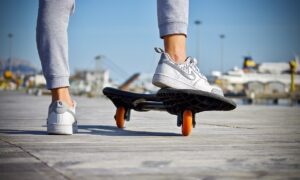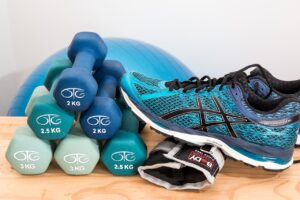Meta Description:
Discover the crucial role of electrolytes during exercise, how they enhance performance, prevent dehydration, and aid recovery, and learn tips for staying hydrated and replenished in 2024.
Introduction:
Electrolytes might not be the first thing that comes to mind when planning your workout, but they are the secret sauce for peak performance and fast recovery! Whether you’re running marathons, hitting the gym, or enjoying a yoga session, electrolytes keep your body functioning like a well-oiled machine. But what exactly are electrolytes, and why are they so important during exercise?
Imagine this: you’re halfway through an intense workout, and suddenly your energy plummets. Sound familiar? It’s not just fatigue – it could be an electrolyte imbalance! In this guide, we’ll uncover the science behind electrolytes, their importance during exercise, and how to maintain the perfect balance for your fitness goals.

Main Headings and Subtopics:
- What Are Electrolytes and Why Are They Important?
- Definition of electrolytes (e.g., sodium, potassium, magnesium, calcium)
- Role of electrolytes in the body (hydration, nerve function, muscle contraction)
- Why exercise increases the demand for electrolytes
- The Role of Electrolytes During Exercise
- How sweating leads to electrolyte loss
- Signs of electrolyte imbalance during exercise (e.g., cramps, dizziness, fatigue)
- Why proper hydration alone isn’t enough
- Benefits of Maintaining Electrolyte Balance While Exercising
- Enhanced muscle performance and endurance
- Reduced risk of cramps and muscle fatigue
- Faster recovery and reduced soreness
- Improved mental focus during workouts
- Common Sources of Electrolytes
- Natural sources: bananas, oranges, leafy greens
- Sports drinks vs. natural alternatives
- Electrolyte supplements: when and how to use them
- How to Calculate Your Electrolyte Needs
- Factors that affect electrolyte loss (intensity, duration, climate)
- How to measure your sweat rate
- General guidelines for electrolyte replenishment
- Tips for Staying Hydrated and Replenished During Workouts
- Pre-workout hydration strategies
- Mid-workout electrolyte replenishment (dos and don’ts)
- Post-workout recovery tips for optimal rehydration
Main Headings and Subtopics with details:
- What Are Electrolytes and Why Are They Important?
Definition of Electrolytes
Electrolytes are essential minerals in your body that carry an electric charge. These minerals include sodium, potassium, magnesium, calcium, chloride, phosphate, and bicarbonate. They are dissolved in bodily fluids such as blood, sweat, and urine, enabling various physiological functions crucial for maintaining balance and performance.
Role of Electrolytes in the Body
Electrolytes play a vital role in maintaining your body’s overall functionality:
- Hydration: Electrolytes help balance the fluids in your cells, tissues, and bloodstream, ensuring you stay hydrated. Sodium, in particular, is crucial for regulating water levels.
- Nerve Function: They transmit electrical signals between nerves, enabling muscle contractions and proper brain function. Potassium and calcium are key players in this process.
- Muscle Contraction: Electrolytes like calcium and magnesium regulate muscle contractions, ensuring they work efficiently and recover properly after use.
- Acid-Base Balance: Electrolytes maintain the body’s pH levels, keeping it within the optimal range for cellular processes.
Why Exercise Increases the Demand for Electrolytes
When you exercise, especially at high intensity or for extended periods, your body loses electrolytes through sweat. The more you sweat, the greater the loss of essential minerals like sodium and potassium.
- Sweating: Even moderate physical activity can lead to significant electrolyte loss, particularly in hot or humid environments.
- Increased Energy Demand: Exercise puts extra stress on muscles and the nervous system, requiring more efficient electrolyte balance to sustain performance.
- Preventing Fatigue: A lack of electrolytes during exercise can lead to dehydration, muscle cramps, and fatigue, making it harder to perform and recover effectively.

- The Role of Electrolytes During Exercise
How Sweating Leads to Electrolyte Loss
During exercise, your body produces sweat to regulate its temperature. Sweat contains water and essential electrolytes, primarily sodium, and smaller amounts of potassium, magnesium, and calcium.
- Volume of Sweat Loss: The more intense or prolonged the exercise, or the hotter and more humid the environment, the greater the sweat loss.
- Electrolyte Depletion: As you sweat, these essential minerals are expelled from your body, leaving less available to support critical functions like hydration, muscle contractions, and nerve signaling.
- Cumulative Effect: Over time, without replenishment, this loss can lead to dehydration and an imbalance in the body’s electrolyte levels.
Signs of Electrolyte Imbalance During Exercise
Electrolyte imbalances can occur quickly during physical activity, especially if the lost electrolytes are not replaced. Here are some common warning signs:
- Muscle Cramps: One of the earliest signs, is caused by a lack of sodium, potassium, or calcium to support proper muscle function.
- Dizziness or Lightheadedness: An indication of low sodium levels or dehydration, affecting blood pressure and circulation.
- Fatigue and Weakness: When electrolytes are depleted, energy production and muscle contractions become less efficient.
- Irregular Heartbeat: An imbalance in potassium or magnesium can disrupt heart rhythm, which is crucial during intense activity.
- Confusion or Poor Focus: Sodium imbalances can affect brain function, leading to foggy thinking or slowed reactions.
Why Proper Hydration Alone Isn’t Enough
Drinking water alone cannot fully address the body’s needs during exercise. While water replaces lost fluids, it does not replenish the electrolytes lost through sweat, which are equally critical for maintaining performance.
- Dilution of Electrolytes: Drinking excessive plain water without replacing electrolytes can dilute sodium levels in the blood, leading to a condition called hyponatremia (low sodium).
- Muscle Performance: Without sufficient sodium, potassium, and magnesium, muscles cannot contract and relax efficiently, leading to cramps and fatigue.
- Sustaining Energy: Electrolytes help the body transport nutrients and maintain energy levels, which water alone cannot achieve.
- Benefits of Maintaining Electrolyte Balance While Exercising
Maintaining proper electrolyte balance during exercise is essential for optimizing physical performance, minimizing discomfort, and enhancing recovery. Here are the key benefits:
Enhanced Muscle Performance and Endurance
- Electrolytes like sodium, potassium, and calcium are crucial for muscle contractions and coordination.
- Balanced electrolytes allow muscles to contract and relax smoothly, supporting sustained physical activity.
- Maintaining the right levels helps prevent premature fatigue, enabling you to perform at your best for longer periods, whether during a workout or a competitive event.
Reduced Risk of Cramps and Muscle Fatigue
- Electrolyte depletion, particularly sodium, potassium, and magnesium, is a leading cause of muscle cramps.
- Replenishing electrolytes ensures proper muscle function, minimizing the risk of painful cramps and spasms.
- Adequate electrolyte levels also prevent the early onset of muscle fatigue, allowing for more effective training sessions.
Faster Recovery and Reduced Soreness
- Electrolytes aid in repairing muscle tissue and reducing inflammation after exercise.
- Calcium and magnesium play a key role in muscle recovery, helping to restore balance and reduce post-workout soreness.
- Proper hydration and electrolyte replenishment accelerate recovery, allowing you to bounce back quickly for your next workout.
Improved Mental Focus During Workouts
- Sodium and potassium are vital for maintaining brain function, as they support nerve signaling and communication.
- Electrolyte balance prevents dehydration, which can lead to poor concentration, slower reaction times, and mental fatigue during workouts.
- Staying mentally sharp allows you to focus on form, maintain motivation, and push through challenging exercises more effectively.
By keeping your electrolyte levels balanced, you can enjoy a more productive, comfortable, and effective workout experience, while also minimizing the risks of dehydration, fatigue, and injury. Whether through sports drinks, supplements, or natural foods, electrolyte replenishment is a non-negotiable for anyone serious about fitness.

- Common Sources of Electrolytes
Replenishing electrolytes during or after exercise is crucial for maintaining optimal performance and recovery. Here are the most common and effective sources of electrolytes:
Natural Sources: Bananas, Oranges, Leafy Greens
Nature provides a variety of foods rich in essential electrolytes:
- Bananas: A powerhouse of potassium, bananas prevent muscle cramps and restore electrolyte balance.
- Oranges: Rich in potassium and vitamin C, oranges help rehydrate and energize the body.
- Leafy Greens: Spinach, kale, and other greens are loaded with magnesium and calcium, supporting muscle function and bone health.
- Coconut Water: Often called nature’s sports drink, it’s packed with potassium and a small amount of sodium, making it an excellent hydration option.
- Avocados: High in potassium and magnesium, avocados are ideal for recovery.
Sports Drinks vs. Natural Alternatives
- Sports Drinks:
- Many commercial sports drinks contain sodium, potassium, and other electrolytes tailored for athletes.
- They are effective for intense or prolonged workouts, especially in hot conditions.
- Be mindful of added sugars and artificial ingredients, which may not be ideal for everyone.
- Natural Alternatives:
- Homemade drinks using water, a pinch of salt, and lemon juice can replenish electrolytes without added sugar.
- Coconut water and fruit smoothies are excellent for hydration and recovery.
- Eating a balanced diet rich in whole foods often provides sufficient electrolytes for moderate activity.
Electrolyte Supplements: When and How to Use Them
Electrolyte supplements, available as tablets, powders, or capsules, can be useful for specific situations:
- When to Use:
- During long-duration or high-intensity workouts where sweating is excessive.
- In hot or humid conditions that increase electrolyte loss.
- After workouts to speed up recovery and rehydration.
- For athletes or individuals following low-carb diets, can affect electrolyte levels.
- How to Use:
- Follow recommended dosages to avoid overconsumption, which can cause imbalances.
- Combine with water to ensure proper absorption and hydration.
- Look for supplements that contain a balanced mix of sodium, potassium, magnesium, and calcium.
- Calculating Your Electrolyte Needs: A Comprehensive Guide
Electrolytes are essential minerals that help regulate various bodily functions, including fluid balance, muscle contractions, and nerve impulses. During intense physical activity, especially in hot and humid conditions, electrolyte loss through sweat can significantly impact performance and overall health.
Factors Affecting Electrolyte Loss
Several factors contribute to electrolyte loss during exercise:
- Intensity: Higher-intensity workouts generally lead to increased sweating and, consequently, greater electrolyte loss.
- Duration: Longer workouts result in more significant sweat losses and electrolyte depletion.
- Climate: Hot and humid conditions exacerbate sweat rates and electrolyte loss.
- Individual factors: Body size, fitness level, and acclimatization to heat can influence sweat rates and electrolyte needs.
Measuring Your Sweat Rate
Accurately measuring your sweat rate can help you determine your specific electrolyte needs. Here are a few methods:
- Sweat patch test: This involves wearing a specialized patch during exercise that collects sweat. The collected sweat is then weighed to estimate sweat loss.
- Body weight method: This method involves weighing yourself before and after exercise, accounting for fluid intake during the activity. The weight difference, minus fluid intake, provides an estimate of sweat loss.
- Subjective assessment: While less precise, monitoring the color and amount of sweat can provide a general idea of sweat loss.
General Guidelines for Electrolyte Replenishment
While individual needs vary, here are some general guidelines for electrolyte replenishment:
- Sodium: Sodium is the primary electrolyte lost through sweat. Aim for 400-800 mg of sodium per hour of exercise.
- Potassium: Potassium is also lost in sweat, especially during prolonged exercise. Consider supplementing with 200-400 mg of potassium per hour.
- Magnesium: Magnesium plays a crucial role in muscle function and can be lost through sweat. Supplementing with 100-200 mg per hour may be beneficial.
- Calcium: Calcium loss through sweat is generally minimal, but supplementing with 100-200 mg per hour may be helpful for some individuals.
Note: These are general guidelines, and individual needs may vary depending on factors such as intensity, duration, climate, and personal factors. It is advisable to consult with a healthcare professional or a registered dietitian to determine your specific electrolyte needs.
Additional Tips:
- Hydration: Proper hydration is crucial for electrolyte balance. Drink plenty of fluids before, during, and after exercise.
- Electrolyte drinks: Sports drinks can provide a convenient way to replenish electrolytes, but choose low-sugar options.
- Electrolyte tablets: These tablets can be dissolved in water to quickly and easily replenish electrolytes.
- Dietary sources: Include electrolyte-rich foods in your diet, such as fruits, vegetables, and dairy products.

- Tips for Staying Hydrated and Replenished During Workouts
Staying hydrated and replenished during workouts is crucial for optimal performance and recovery. Here are some tips to help you achieve this:
Pre-Workout Hydration Strategies
- Hydrate throughout the day: Don’t wait until right before your workout to start hydrating. Aim to consume adequate fluids throughout the day leading up to your exercise session.
- Pre-workout hydration: About 2-3 hours before your workout, drink 500-600 ml of fluids. This will help ensure you’re well-hydrated going into your exercise.
- Consider electrolytes: If you’re sweating heavily or exercising in hot conditions, consider consuming a sports drink or electrolyte supplement before your workout to pre-load your system.
Mid-Workout Electrolyte Replenishment
- Listen to your body: Drink fluids regularly throughout your workout, even if you don’t feel thirsty. Thirst is a lagging indicator of dehydration.
- Choose the right fluids: Water is generally sufficient for workouts lasting less than an hour. For longer or more intense workouts, consider sports drinks or electrolyte tablets to replenish electrolytes lost through sweat.
- Avoid excessive fluid intake: Overhydration can be just as detrimental as dehydration. Drink to thirst and avoid excessive fluid consumption.
Post-Workout Recovery Tips for Optimal Rehydration
- Replenish fluids immediately: After your workout, consume fluids promptly to replace sweat losses.
- Consider electrolyte-rich foods: Include electrolyte-rich foods in your post-workout meal or snack, such as fruits, vegetables, and dairy products.
- Monitor urine color: Use urine color as a general indicator of hydration status. Pale yellow urine is a good sign of adequate hydration.
Additional Tips:
- Personalize your hydration strategy: Individual needs for fluid and electrolyte intake can vary depending on factors such as intensity, duration, climate, and personal factors.
- Consult a professional: If you have any concerns about hydration or electrolyte balance, consult with a healthcare professional or a registered dietitian.
FAQ: The Importance of Electrolytes During Exercise
What are electrolytes?
Electrolytes are minerals that carry an electrical charge. They play a crucial role in many bodily functions, including muscle contractions, nerve impulses, and fluid balance. Common electrolytes include sodium, potassium, magnesium, and calcium.
Why are electrolytes important during exercise?
During exercise, especially in hot and humid conditions, you lose electrolytes through sweat. This electrolyte loss can lead to:
- Muscle cramps and fatigue
- Dehydration
- Decreased performance
- Increased risk of heat-related illnesses
How do electrolytes affect exercise performance?
Adequate electrolyte levels help to:
- Maintain proper muscle function
- Regulate fluid balance
- Prevent muscle cramps
- Improve endurance
- Enhance recovery
How can I replenish electrolytes during exercise?
- Hydration: Drink plenty of fluids before, during, and after exercise.
- Electrolyte drinks: Sports drinks can provide a convenient way to replenish electrolytes, but choose low-sugar options.
- Electrolyte tablets: These tablets can be dissolved in water to quickly and easily replenish electrolytes.
- Dietary sources: Include electrolyte-rich foods in your diet, such as fruits, vegetables, and dairy products.
What are the signs of electrolyte imbalance?
Signs of electrolyte imbalance can include:
- Muscle cramps
- Fatigue
- Weakness
- Headache
- Dizziness
- Nausea
- Vomiting
When should I consult a healthcare professional?
If you experience severe or persistent symptoms of electrolyte imbalance, consult with a healthcare professional or a registered dietitian.

Semantic Keywords:
- electrolyte balance
- benefits of electrolytes
- electrolytes in exercise
- hydration during exercise
- sports drinks with electrolytes
- electrolyte-rich foods
- dehydration symptoms
- muscle cramps and electrolytes
- sodium and potassium for athletes
- magnesium benefits for exercise
- calcium for muscle function
- electrolyte supplements
- natural hydration tips
- sweat rate calculation
- performance hydration
- electrolyte drinks comparison
- hydration strategies for athletes
- post-workout recovery drinks
- signs of dehydration during exercise
- electrolytes and mental focus
- endurance sports hydration
- electrolyte replenishment guide
- preventing fatigue with electrolytes
- natural sports drink recipes
- electrolyte loss through sweat
- hydration myths
- staying hydrated in summer workouts
- sodium intake for athletes
- potassium deficiency symptoms
- hydration for marathon runners
- benefits of magnesium in fitness
- muscle soreness recovery tips
- daily electrolyte needs
- proper hydration techniques
- best electrolyte Supplements 2024
- isotonic drinks vs. electrolyte drinks
- homemade electrolyte solutions
- replenishing electrolytes naturally
- hydration for high-intensity workouts
- workout performance enhancers
- hydration tips for gym enthusiasts
- balanced electrolyte levels
- electrolyte intake calculator
- optimal hydration for athletes
- sweating and mineral loss
- electrolyte drinks for kids
- fitness hydration mistakes
Conclusion:
Electrolytes are the unsung heroes of exercise, powering every step, rep, and stretch. By understanding their role and replenishing them effectively, you can push your limits, recover faster, and avoid the dreaded mid-workout slump. Whether through nutrient-rich foods, supplements, or electrolyte-packed drinks, staying balanced is key to maximizing your fitness potential.


Leave a Reply